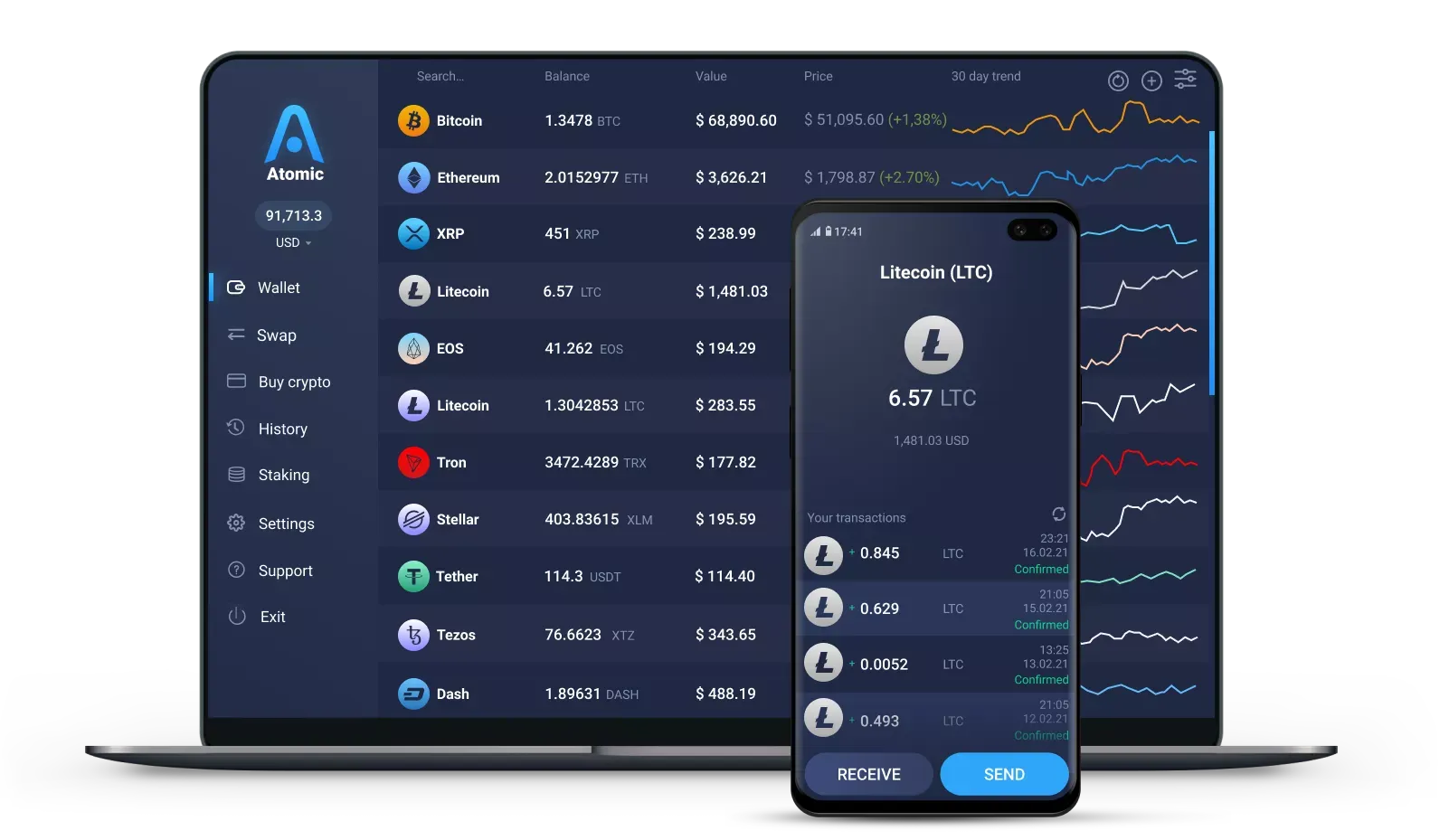Trusted Reviews
Why Choose Atomic Litecoin wallet
What is Litecoin (LTC)?
To gain a comprehensive grasp of Litecoin (LTC), it's essential to start with its origins and key distinctions from Bitcoin (BTC).
Introduction to Litecoin
Litecoin, often referred to as "silver to Bitcoin's gold," was created by former Google engineer Charlie Lee in 2011. It was designed to address some of Bitcoin's limitations, such as slow transaction processing speeds (Forbes). Litecoin aims to facilitate nearly instant and low-cost payments, making it an attractive alternative for everyday transactions.
Litecoin (LTC) was built as an altcoin, drawing from Bitcoin's open-source code but incorporating several modifications. Key among these changes were:
- Faster block generation rate: Litecoin significantly decreased the block generation time to 2.5 minutes compared to Bitcoin's 10 minutes.
- Different PoW mining algorithm: Litecoin uses the Scrypt algorithm, which consumes less processing power compared to Bitcoin's SHA-256 algorithm.
These modifications contribute to Litecoin's higher transaction per second (TPS) capability, making it more scalable and suitable for everyday use.
Litecoin vs. Bitcoin
Though Litecoin and Bitcoin share similarities, they have critical differences that impact their functionality and use-cases.
Feature | Litecoin (LTC) | Bitcoin (BTC) |
|---|---|---|
Creator | Charlie Lee | Satoshi Nakamoto |
Year of Creation | 2011 | 2009 |
Block Generation | 2.5 minutes | 10 minutes |
Total Supply | 84 million coins | 21 million coins |
Mining Algorithm | Scrypt | SHA-256 |
Transaction Speed | Approximately 56 TPS | Approximately 7 TPS |
Primary Use | Daily transactions, low-cost payments | Store of value, larger transactions |
Market Perception | Silver to Bitcoin’s gold, everyday transaction utility | Digital gold, long-term value storage |
Litecoin's shorter block generation time allows for faster transaction confirmations, which is particularly beneficial in scenarios requiring quick payments. Bitcoin, on the other hand, is often favored for its security and store-of-value properties.
Understanding the nuances between Litecoin and Bitcoin is crucial for traders and investors looking to diversify their crypto portfolios or leverage the unique advantages each cryptocurrency offers. For those interested in daily transactions and lower transaction fees, Litecoin presents a viable alternative.
Key Features of Litecoin
To fully grasp the advantages of Litecoin (LTC), it's essential to understand its key features. These include transaction speed and block time, scalability, and its supply limit.
Transaction Speed and Block Time
Litecoin significantly outpaces Bitcoin in terms of transaction processing speed. While Bitcoin processes around 7 transactions per second, Litecoin handles approximately 56 transactions per second (Forbes). This enhanced speed allows for quicker verification and approval of transactions, which is advantageous for both users and merchants.
One of the main technological differences between Litecoin and Bitcoin is block time. Litecoin's blockchain creates new blocks roughly every 2.5 minutes, compared to Bitcoin’s 10 minutes. This means that transactions on the Litecoin network are confirmed faster, making it more efficient for everyday use.
Feature | Litecoin | Bitcoin |
|---|---|---|
Transactions/s | 56 | 7 |
Block Time | 2.5 minutes | 10 minutes |
Litecoin's Scalability
Scalability refers to a cryptocurrency's ability to handle a growing number of transactions without compromising performance. Litecoin's higher transaction speed inherently boosts its scalability by enabling more transactions to be processed in less time.
The Scrypt algorithm used in Litecoin mining also aids in scalability. Unlike Bitcoin’s SHA-256, Scrypt is designed to be more memory-intensive and less reliant on brute computational power. This makes Litecoin more accessible to a broader range of miners, including those who may not have advanced hardware.
Litecoin is widely accepted by merchants and stores around the globe, with more than 2,000 businesses accepting LTC, making it easier for users to spend their LTC on goods and services (Forbes). This broad acceptance is a testament to its scalability and practicality.
Litecoin's Supply Limit
Similar to Bitcoin, Litecoin has a supply limit, making it a deflationary cryptocurrency. Litecoin has a total supply of 84 million coins, which is four times the supply limit of Bitcoin. This limited supply helps to create scarcity, potentially increasing the value of LTC over time (Binance Academy).
Additionally, Litecoin undergoes a "halving" event approximately every four years, or every 840,000 blocks. During this event, the reward for mining new blocks is reduced by half, making it harder to produce new Litecoin and further limiting the supply.
Feature | Litecoin | Bitcoin |
|---|---|---|
Total Supply | 84 million | 21 million |
Halving Interval | 840,000 blocks | 210,000 blocks |
Current Circulating Supply | Over 66 million | Over 19 million |
Understanding these key features—transaction speed and block time, scalability, and supply limit—provides investors and traders with a comprehensive view of what Litecoin offers. These elements combine to make LTC an attractive option in the cryptocurrency market, known for its faster transaction processing, broad acceptance, and deflationary nature.
Litecoin Technology and Development
The technological backbone of Litecoin (LTC) has played a notable role in the broader cryptocurrency ecosystem. The cryptocurrency, founded by Charlie Lee in 2011, aims to be a lighter and faster version of Bitcoin. With its modifications to Bitcoin's original code, Litecoin has become a key player in testing new blockchain technologies.
Testing Ground for Innovations
Litecoin has served as a pioneering platform for various blockchain innovations intended for Bitcoin. This has allowed developers to experiment and refine different technological concepts before implementing them on more widely-used platforms.
- Segregated Witness (SegWit): Litecoin was among the first cryptocurrencies to adopt SegWit, a protocol enhancement that separates witness data from the transaction data
- Lightning Network: Leveraging Litecoin's faster block generation times, the Lightning Network offers almost instantaneous transactions. Again, Litecoin was a leader in implementing this off-chain solution for improving transaction speed and cost-efficiency
- MimbleWimble Extension Block (MWEB): This protocol aims to enhance transaction privacy, making Litecoin a viable option for users concerned about confidentiality (Binance Academy).
Mining and Centralization Concerns
While Litecoin was initially designed to deter the dominance of Application-Specific Integrated Circuits (ASICs) by utilizing the Scrypt Proof of Work (PoW) algorithm, the release of Litecoin-specific ASIC miners in 2014 altered the mining landscape substantially (Investopedia). This shift brought about concerns regarding centralization.
- ASIC Mining: The advent of ASIC miners designed specifically for Litecoin led to increased mining centralization. Initially, Litecoin aimed to allow more individuals to participate in the mining process without the need for specialized hardware.
- Centralization Risks: The rise of ASIC miners has led to significant hash power being concentrated in the hands of a few major mining pools, which can pose a risk to the network's decentralization and security.
The technological advancements and mining dynamics within Litecoin have positioned it as both a testing ground for innovations and a subject of centralization debates. Understanding these aspects can provide a comprehensive insight into the technological and development intricacies of Litecoin.
By exploring Litecoin’s role in pioneering new technologies and examining the complexities of its mining ecosystem, traders and investors can gain a nuanced understanding of what LTC is and why it remains significant in the cryptocurrency space.
Litecoin Mining in 2024
In 2024, mining Litecoin has become more competitive and requires specialized hardware. The best method for mining Litecoin is through Application-Specific Integrated Circuit (ASIC) miners compatible with Scrypt. This mining algorithm, different from Bitcoin's SHA-256, is designed to be ASIC-resistant to an extent but has seen a significant increase in ASIC miner efficiency. Joining a mining pool has become necessary due to increased network competition and efficiency. Mining Litecoin using personal computers is no longer profitable or feasible.
Mining Method | Feasibility |
|---|---|
Personal Computers | Not Feasible |
ASIC Miners (Scrypt) | Highly Recommended |
Joining Mining Pools | Essential |
Future Outlook for Litecoin
The future outlook for Litecoin remains promising, supported by its role in experimenting with advanced blockchain technologies. For instance, it has been a testing ground for innovations intended for Bitcoin, such as the Lightning Network, Segregated Witness (SegWit), and the MimbleWimble Extension Block (MWEB) protocol, aimed at enhancing transaction privacy (Binance Academy).
An upcoming significant event for Litecoin is its next halving in 2027. During this event, the miner rewards for successfully recording new blocks to the blockchain will be halved. This reduction in reward, occurring at regular intervals, could affect mining profitability and the overall supply dynamics of Litecoin (Forbes).
Event | Expected Date |
|---|---|
Next LTC Halving | 2027 |
Litecoin's market behavior, mining developments, and upcoming technical milestones suggest strong interest and involvement in this cryptocurrency, making it a relevant choice for traders and investors exploring the cryptocurrency landscape.
Setting up Atomic LTC Wallet
Download and install
In order to enjoy the functionality of the Atomic LTC Wallet, one first needs to go through a simple process of creating a wallet.
- Download the installation file for your operating system from the official website and install the app. If you’re setting up a mobile wallet, the process is even simpler, since you’ll be installing via a marketplace automatically. If you need more specific instructions regarding a certain platform, check out our installation guide!
- After that’s done, run Atomic wallet, click ’Create Wallet,’ set up a strong password, and click Set Password. Make sure it is a unique and secure password that you don’t use for anything else.
- You will now see a 12-word seed phrase that can be used to restore access to the wallet. Be sure to keep it in a safe and secret place! Then click ’Open Wallet.’
- That’s pretty much it! You can now use the Atomic SOLwallet. Find your wallet address and you can deposit the funds right away.
You can find a step-by-step guide on creating a wallet in Atomic and if you encounter any difficulties with any of the steps, feel free to contact our customer support by filling out this form.




















